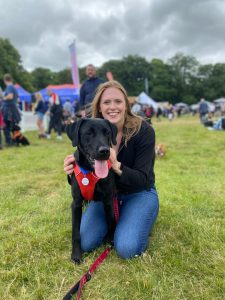- Ellie Ball, PhD Scholar
- My research focuses on QR code engagement, looking specifically at QR code security and QR code scam susceptibility. The prevalence of QR code scams is increasing and between April 2024 and April 2025, £3.5 million were lost to fraudulent QR codes in the UK. My research looks to examine how users, young and old, are engaging and behaving with QR codes in the domains of attitude, cognition, and behaviour to develop a deeper understanding of the factors that could make users more susceptible to QR code scams. Ultimately, it is hoped that the findings from my research will improve the efficacy and specificity of future scam intervention plans to reduce the number of individuals falling victim to malicious QR codes.
- Holly Barnett, PhD Scholar
 Misinformation and disinformation are increasingly used to deceive individuals online. Accordingly, my research focuses on older adults’ ability to detect misinformation, with a specific emphasis on fake news shared via social media. Throughout my PhD, I’ll be exploring psychological interventions aimed at reducing susceptibility to misinformation and evaluating their effectiveness among both older and younger adults. I’m particularly interested in how individual factors, such as self-efficacy, working memory, and political orientation, influence our ability to identify false information. I also plan to use methods such as eye-tracking to better understand how people visually engage with online content. While many organisations are working to improve older adults’ access to technology, this research is crucial to ensure they are also equipped with the skills to navigate digital spaces safely. In doing so, my research will contribute to the growing body of work on older adults’ confidence in an era of rapidly evolving technology. Ultimately, this research will support efforts to reduce online deception across age groups in response to the recent rise in fake news.
Misinformation and disinformation are increasingly used to deceive individuals online. Accordingly, my research focuses on older adults’ ability to detect misinformation, with a specific emphasis on fake news shared via social media. Throughout my PhD, I’ll be exploring psychological interventions aimed at reducing susceptibility to misinformation and evaluating their effectiveness among both older and younger adults. I’m particularly interested in how individual factors, such as self-efficacy, working memory, and political orientation, influence our ability to identify false information. I also plan to use methods such as eye-tracking to better understand how people visually engage with online content. While many organisations are working to improve older adults’ access to technology, this research is crucial to ensure they are also equipped with the skills to navigate digital spaces safely. In doing so, my research will contribute to the growing body of work on older adults’ confidence in an era of rapidly evolving technology. Ultimately, this research will support efforts to reduce online deception across age groups in response to the recent rise in fake news.
- Now Dr. Julian Bjerkan, Sir John Fisher PhD Scholar

For my PhD I am working to better understand brain functioning in Huntington’s disease (HD), Alzheimer’s disease (AD) and healthy ageing, using converging methods that incorporate neurocognitive measures, functional brain activity and modelling. This is close to what I worked on for my Master project where I only compared subjects with AD and healthy age-matched controls. The measurements use electroencephalogram (EEG) which measures the electrical activity of the brain and near infrared spectroscopy (NIRS) which measures changes in the oxygenation concentration in the brain. The combination of these two methods provide a powerful approach to the regulation of cognitive neural networks. The link between increased neuronal activity and increased blood flow is known as neurovascular coupling, and there is compelling evidence that neurovascular coupling is impaired in several neurodegenerative diseases including AD and HD. My interest is to see how these non-invasive measuring methods can be used to distinguish healthy elderly subjects from subjects with AD and HD, and to see if the different diseases can be characterized from the data. Many studies have already looked at the EEG power spectra in both HD and AD, and interesting differences from controls have been found. Functional connectivity studies have also defined differences between diseased subjects and controls. My research interest is to study the dynamics of the signals, to see how they change in time and how they are related. For this time-frequency analysis methods are used – such as the Wavelet transform. The aim is also to see how the changes in dynamics are correlated with different cognitive tests, in order to probe the complex links between cognition and brain dynamics.
- Now Dr. Radoslaw Wincza, Lancaster University, PhD Scholar

My research focuses mainly on understanding the imperfections of our visual perception and how it can differ from the physical reality. To do so I am extensively researching visual illusions, a phenomenon that offers a unique window to understanding how our perception works. My previous projects have investigated how the perception of visual illusions is affected by development, genetics, mental health disorders, like schizophrenia or autism, and visual expertise. Lately, I became interested in the methodological differences in research on visual illusions as well as eye movements while observing visual illusions. My PhD project will be a continuation of my previous research and I will expand into new disorders like dementia and Parkinson’s, as well as incorporate new research methods into my research.
- Now Dr. Ellie Smith, Leverhulme Trust Doctoral Scholar

My PhD research explored the influence parental schizotypy has on infant and childhood risk for mental health disorders utilising electroencephalography and event-related component analyses. My thesis explored how early and late (i.e. high and low-level) cortical markers of risk for schizophrenia in schizotypal mothers were not overtly present in their 6-month-old offspring on a group level but were present through correlational analyses; suggesting that proneness to schizotypal traits must develop later in childhood.
In my Post-Doctoral research at the University of Cambridge, I aimed to explore the behavioural and neurophysiological mechanisms of expectation learning in infancy, using a sophisticated model-based computational approach. I was interested in observing how infants learn to associate sounds and images and how they adapted their learning strategies in volatile environments.
Now having shifted my career into Research Consultancy, I am still research active; exploring my primary research interests of infant learning but also oculomotor deficits between diagnoses (predominantly psychoses) and transdiagnostically across diagnostic groups.
- Now Dr. Joe Pearson, ESRC PhD Scholar

Experiences of criminal victimisation have been associated with short- and long-term health effects such as depression and post-traumatic stress disorder, as well as greater risks of mortality and hospitalisation amongst older victims. The presence of supportive family and friends has, however, been linked to more positive and successful recovery following victimisation. Yet, advanced age brings life changes (such as bereavement and retirement) that reduce the ability of older adults to access the social support that appears to be so crucial to effective post-victimisation recovery. With the number of elderly UK residents set to increase by 8.6 million in the next 50 years, and in light of Covid-19-related social distancing measures (thanks to which we are all more appreciative of our social network’s benefits), it is vital that the capacity of social support and social isolation to aid or impair post-victimisation recovery in older adults is understood. I am using secondary data collected by the English Longitudinal Study of Ageing to investigate the longitudinal effects of criminal victimisation on the health of older adults, paying particular attention to the extent to which social support influences those effects.
Now Dr. Beth Cheshire, PhD Gas Safety Trust

Currently, there is a knowledge gap regarding ‘safe’ levels of carbon monoxide (CO) exposure and whether chronic exposure to low-levels of CO are associated with neuropsychological deficits. Working alongside West Midlands Fire Service, the PhD examines the health and cognitive effects of such exposures from household appliances such as cookers and heaters within an older adult population. Although limited, chronic exposure studies of low-level CO indicate the presence of neuropsychological deficits such as memory and attention impairments following these less severe exposures. Older adults may be more susceptible to the effects of CO due to reduced physiological reserve and pre-existing disease through which the adequate regulation of oxygen supply or metabolism is already compromised. Fire Officers often report high levels of confusion in older residents who may be at risk of chronic CO exposure at levels not sufficient to trigger CO alarms, but which could still be harmful to health. With evidence indicating that neuropsychological deficits may result from less severe CO exposures, and that older adults may be particularly vulnerable, such exposures may be a significant unidentified cause of cognitive impairments that improved awareness and identification could prevent. The research examines the prevalence of low-level CO within a sample of older adult homes in Coventry and aims to determine the effects of such exposures on cognitive function, health and mental health. The extent to which intervention by the Fire Service, in reducing levels of CO in the home, results in measurable changes in functioning over time will also be examined.
- Now Dr. Claire Kelly, ESRC PhD Scholar, Research Associate

Previous research has shown that completing two sequential self-control tasks is difficult and typically a temporary deterioration in self-control performance in the second task is observed. My research aims to examine why this is and uses eye tracking as a way of measuring self-control ability and the factors that influence this behaviour. Specifically we explore whether having higher relative to lower levels of motivation has an ameliorating effect on a temporary deterioration in self-control as well as investigating whether a physiological resource such as glucose actually fuels self-control, leading to the successful application of self-control over time.
- Now Dr. Megan Rose-Readman, ESRC PhD Scholar

I am interested in the effects Parkinson’s disease has on patients ability to use perceptual information to anticipate and update their perceptions of their action capabilities. Neurotypical populations readily update their perceived capabilities following physiological and/or morphological changes to the body. A vast body of research has implicated that this process primarily occurs in the basal ganglia, the same brain region thought to be disrupted in Parkinson’s disease. As a consequence one would reasonably predict that Parkinson’s patients ability to anticipate and update their perception of action capabilities would be atypical. I aim to decipher whether this is the case and the magnitude of the irregularities. I am also interested in how other neuropsychological disorders effect perceptual and action capabilities and the subsequent implications this may have on brain regions. I am funded by the ESRC as part of the North West Social Science Doctoral Training Partnership.
Now Dr. Megan Polden, Sir John Fisher PhD Scholar

I am interested in working memory in younger and older adults and the methods which can be used to enhance memory and cognition. Research has shown that visual behavior can temporarily improve short-term memory and recall abilities in both younger and older adults. The theories behind this memory enhancement are currently unclear and require further research to fully understand this effect. My research aims to further investigate methods of memory enhancement and with the use of brain activity monitoring techniques investigate the mechanisms which lead to memory enhancement after bilateral eye movements. Further, I will apply established methods of memory and cognition enhancement to patients with mild cognitive impairment and Alzheimer’s disease to investigate whether these methods of enhancement can be of benefit to these patient groups.
Lettie Wareing, ESRC PhD Scholar

My main research interest is Anorexia Nervosa. Specifically, I am interested in interoceptive deficits within this population and their role in the pathogenesis and maintenance of Anorexia Nervosa in the context of predictive coding models. Research has shown that, in healthy individuals, the ability to sense the internal signals coming from one’s body (interoception) are vital for the development of a sense of self and belonging within one’s own body. These interoceptive signals are integrated with exteroceptive sensory signals (those external to the body e.g. vision) to form a coherent percept of the self as belonging within a body, within the environment. Consequently, if this interoceptive stream is not successfully integrated with other sensory streams within the brain, this could have negative implications for our sense of self and how we view ourselves with respect to our environment. With regards to Anorexia Nervosa, a failure to correctly integrate interoceptive streams into our sense of self could lead to an overreliance on external sensory signals and, in turn, feelings of detachment and self-objectification that can result in body dissatisfaction. Moreover, a failure in multisensory integration can lead to improper updating of stored bodily representations with changes to morphology that occur with weight loss; leading to an outdated, oversized self-representation. My research intends to investigate these concepts using both cognitive and neuroscientific methodologies including virtual reality, electroencephalography, electrocardiograms, respiration monitors, and near-infrared spectroscopy. It is hoped that these approaches will give a better insight into interoception in Anorexia Nervosa and its links to clinical symptomology. Moreover, on the basis of these findings, I intend to explore the potential of Biofeedback as a new therapeutic intervention for Anorexia Nervosa. It is hoped that the improvements in interoception brought about by Biofeedback training may subsequently improve symptomology in individuals with Anorexia Nervosa.
John Oyewole , ESRC PhD Scholar

My research focuses on how athletes perceive their affordances (action capabilities), within their highly dynamic sporting environments. In these settings, the actions available to an athlete continuously evolve as the game itself does. Research has shown that athletes are able to perceive the changing affordances of themselves and others, including teammates and opponents, enabling them to perform complex actions successfully while avoiding undesirable outcomes. One such complex action, pivotal across many sports, is interception: the act of stopping an object from continuing along it’s trajectory. While interceptive actions have been thoroughly explored in striking sports such as cricket and baseball, they remain understudied in invasion sports like football and basketball. My research aims to bridge this gap by examining how athletes perceive their affordances for interception when faced with competitive opponents during invasion sports. I will investigate how various factors, including target speed, opponent characteristics, and situational context, influence athletes’ perception of their interceptive affordances. To achieve this, I will be combining virtual reality and eye-tracking technology, while conducting real-life small-scale experiments, and video analysis of professional gameplay. Ultimately, my goal is to shed light on the mechanisms behind rapid split-second interceptive decision-making, offering insights to improve on-field performance and give athletes a competitive edge over their rivals.

